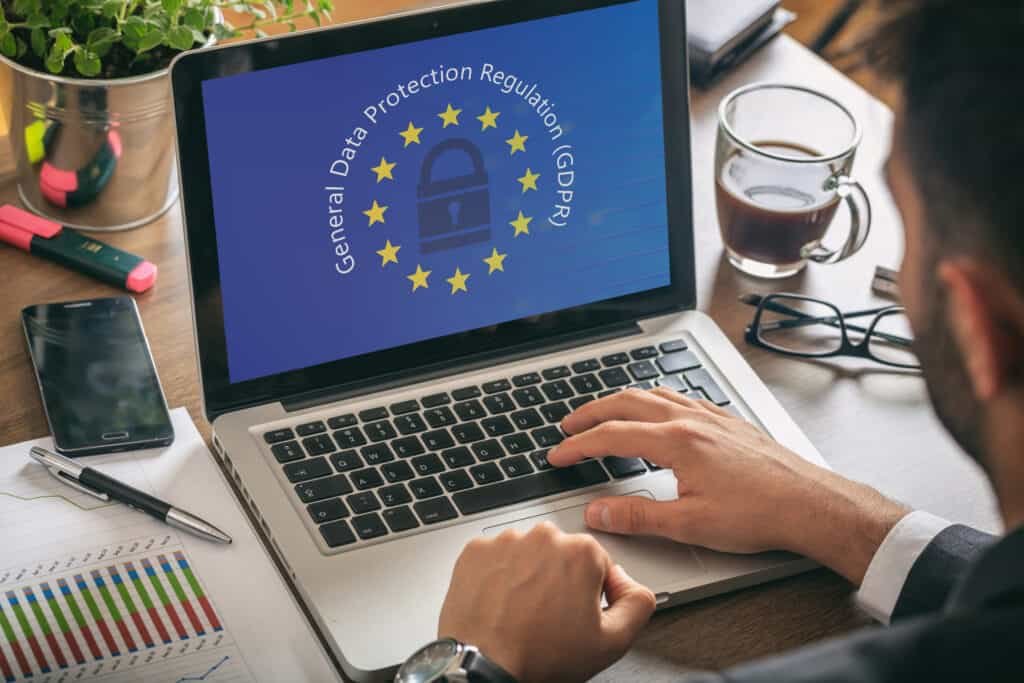Essential Cyber Security Awareness Training Topics for 2024

We may earn a small fee from the companies mentioned in this post.
In today’s digital world, cyber security attacks are on the rise, and organisations are struggling to keep up. One of the most effective ways to protect your organisation from cyber threats is by implementing cyber security awareness training.
In this blog post, we will explore the importance of cyber security awareness, discuss key components of training programmes, and provide guidance on securing physical documents, cloud security, data protection, social media, and privacy. Let’s dive in and discover how your organisation can stay one step ahead of cyber criminals!
Short Summary Cyber-Security Awareness
Cyber security awareness training is essential to mitigate risks and maintain trustworthiness.
Training should cover a range of topics, such as email/internet security, mobile device & remote working security, social engineering & phishing.
Organisations must customise training for their specific goals with engaging methods and track impact through Key Performance Indicators (KPI)’s to ensure effectiveness.
The Importance of Cyber Security Awareness

The rapidly evolving digital landscape has exposed businesses to a myriad of cyber threats. Cyber security awareness training is crucial to prevent security incidents, as over 90% of these incidents are a result of cybercriminals targeting employees.
By cultivating a security-focused organisational culture, companies can minimise the risk of cyber security incidents, enhance employee morale, and augment customer trust.
Human Error and Security Incidents
Human error plays a significant role in cyber breaches, accounting for more than 90% of incidents. As the workforce becomes increasingly mobile and remote, the importance of educating employees on safe remote working practices cannot be understated.
Cyber security awareness is a vital tool in helping employees recognise malicious tactics employed by cybercriminals, understand how they can be susceptible to such threats, detect potential risks, and take the necessary steps to avoid being affected by these malicious threats. This makes cybersecurity awareness important for the overall security of an organisation, especially during cybersecurity awareness month when the focus on security awareness is heightened.
Benefits of a Security-Focused Organisational Culture
Developing a security-oriented culture within an organisation can provide numerous advantages, such as a more secure workforce, enhanced protection of corporate resources, decreased internal risks, and a strengthened reputation with customers. Cyber security awareness month is an excellent opportunity to emphasise the importance of this culture.
By fostering a security-conscious workforce through the adoption of security-related behaviours and raising employee awareness of potential security risks, organisations can significantly improve their organisation’s security posture. Employee engagement in security behaviours, reporting suspicious activity, and rewarding employees for following security protocols are some of the ways organisations can promote desired security behaviours among staff.
Key Components of Cyber Security Awareness Training

Cyber security awareness training should cover a wide range of topics to ensure a comprehensive understanding of potential threats and best practices. Some essential components of such training programmes include email and internet security, mobile device and remote working security, and social engineering and phishing. Cyber security training plays a crucial role in enhancing security awareness among employees.
In the following sections, we will delve deeper into each of cyber security awareness topics and provide valuable insights to help organisations strengthen their defences against cyber threats.
Email and Internet Security
Safe email and internet practices are crucial for protecting sensitive information and mitigating the risk of security incidents. Email security training is a critical component of cyber security awareness training, as approximately 94% of malicious ransomware and other malware are introduced to an organization through email.
Password security is another vital aspect of email and internet security. Easily guessed passwords or recognisable password patterns can facilitate cyber criminals in accessing a variety of accounts. Employing randomised passwords and two-factor authentication can significantly impede malicious actors from gaining access to multiple accounts, while also providing additional security to protect the account integrity.
Mobile Device and Remote Working Security
The use of mobile devices for work, especially for remote workers, presents an elevated risk of security breaches. Educating employees on safe remote working practices is essential to minimize the possibility of security breaches and promote cyber awareness.
To ensure mobile device security, it is recommended to implement password protection, encryption, and biometric authentication for sensitive information, as well as to provide training for employees on the safe use of personal devices. In addition, organisations should implement a mobile security policy to ensure that personnel are cognisant of the organisation’s standards and optimal practices for mobile device security.
Social Engineering and Phishing
Social engineering and phishing are techniques employed by malicious actors to gain unauthorised access to sensitive information or resources. Social engineering involves utilising psychological manipulation to induce individuals to carry out certain actions or disclose confidential information, while phishing is a type of social engineering attack that uses email or malicious websites to acquire personal data.
In order to reduce the likelihood of a social engineering or phishing attack, it is recommended to set spam filters to high, use different passwords for different accounts, verify the security of a website before sending sensitive information over the internet, and provide security awareness training to employees.
To promote awareness of cyber security, it is important to implement effective training programmes and the development of skills that can help employees identify warning signs and decrease the likelihood of falling victim to these techniques.
Checkout our informative article on how to get into cyber security within the UK
Enhancing Physical Security Measures

While digital threats are the primary concern for most organisations, it is essential not to overlook the importance of physical security measures. A clean-desk policy is a security measure that requires employees to maintain their workspaces free of sensitive documents and information when they are not present.
By implementing access control, surveillance, and providing security training to employees, organisations can improve their physical security measures and ensure the protection of valuable assets and sensitive information.
Checkout our informative article on ‘7 types of cyber security threats’
Cloud Security and Data Protection

The rise of cloud computing has brought numerous benefits, such as improved accessibility and cost-efficiency. However, it has also introduced new security challenges. Cloud security and data protection involve safeguarding data stored in the cloud from unauthorized access and malicious attacks.
To ensure the security of cloud-based applications and data, it is essential to understand the shared responsibility model, implement identity and access management, encrypt data, and monitor for suspicious activity. Additionally, organisations should comply with relevant standards such as ISO, PCI DSS, HIPAA, and GDPR to ensure the highest level of security and data protection.
Social Media and Privacy

With the ubiquity of social media, it is increasingly important for employees to understand the need to maintain privacy settings on social media platforms and prevent the spread of company information. Educating employees on these privacy settings can mitigate the danger of potential leverage that hackers may acquire from access to personal networks.
Recommended practices for social media and privacy include using strong passwords, enabling two-factor authentication, being mindful of sharing personal information, and regularly reviewing privacy settings.
Customising Cyber Security Awareness Training
A one-size-fits-all approach to cyber security awareness training may not be sufficient for every organisation. Customising training programmes to cater to an organisation’s specific goals and requirements is crucial for ensuring the effectiveness of the training. Organisations can gain an understanding of their baseline by assessing their current security posture, recognising any deficiencies in security knowledge, and determining their security objectives.
By tailoring the training to the specific roles and groups within the organisation, the training will be more pertinent and effective for each group. Engaging and interactive content, such as videos, quizzes, and games, along with the organisation’s branding in the training materials, can maintain consistency of the organisation’s message and improve the overall effectiveness of the training.
Implementing Effective Training Methods

To ensure maximum engagement and retention of information, organisations should explore various training delivery methods, such as classroom-based training programmes, interactive training, on-the-job training, coaching/mentoring, and e-learning. Engaging, interactive, and relevant training methods tailored to the learners’ needs are essential for successful implementation.
Additionally, having clear learning objectives and assessing learners’ progress through tests, quizzes, and other forms of assessment are important considerations for an effective training programme.
Security Awareness Month Ideas
October is globally recognised as Cybersecurity Awareness Month, a time dedicated to promoting cybersecurity best practices and educating individuals and organisations about the importance of online safety.
As the digital landscape continues to evolve, bringing forth new challenges and threats, you should consider using Cyber Security awareness month as a businesswide focus for cybersecurity awareness themes, that could prove effective, enhancing your cyber secruity efforts.
You may also consider guest speakers, perhaps focus on phishing attacks, or the prevention of a security breach, whatever works for your organistion.
Measuring the Impact of Cyber Security Awareness Training

Evaluating the effectiveness of cybersecurity training programs is essential to ensure that personnel are adequately instructed and informed concerning the most recent security risks and optimal practices. It also assists organisations in recognising areas where extra training might be required and making necessary modifications to attain improved results.
Recommended approaches for assessing the effectiveness of cyber security awareness training include tracking participation rates, completion rates, quiz scores, phishing simulation results, and utilizing surveys and KPIs to evaluate knowledge, attitude, and behaviour change.
By utilising tests, verifications, interviews, simulated events, and employee feedback, organizations can gain a comprehensive view of the efficacy of the training programme, pinpoint areas that require additional training, and make the necessary modifications to boost results.
Checkout our informative article on how to get into Cyber Security within the UK
Regulatory Compliance and Cyber Security Awareness

Compliance with regulations such as GDPR is essential for organisations, and cyber security awareness training plays a crucial role in achieving compliance. There are businesses that offer a managed service which provides an online course for GDPR training for all employees.
Violating GDPR regulations may result in significant penalties, highlighting the importance of a thorough understanding of the regulations and their implications. Utilising automated online platforms for policy management can ensure employees are kept up to date with the latest changes in policy and remain informed, contributing to an organisation’s regulatory compliance.
Checkout our blog on Cyber Security Awareness Training For Employees
Summary
In conclusion, implementing a comprehensive cyber-security awareness training program is crucial for organisations to protect themselves from the ever-evolving landscape of cyber threats. By addressing key components such as email and internet security, mobile device and remote working security, and social engineering and phishing, organisations can equip their employees with the knowledge and skills required to identify and avoid threats.
Customising training programmes to cater to specific needs, implementing effective training methods, and continuously evaluating the impact of training will contribute to a more secure and resilient organisation. Remember, a well-informed workforce is your strongest line of defence against cyber attacks!
Frequently Asked Questions
What is meant by Cyber security awareness?
Cyber security awareness is an important step in protecting yourself and your organisation from malicious actors. It involves understanding the threats, recognising their impacts, and implementing measures to mitigate risks. To do this, you need to be aware of the latest cyber security trends and best practices. This includes staying up to date on the latest threats, understanding the different types of threats.
How important is Cyber security awareness?
Cyber-security awareness is essential for protecting businesses and customers from cyber threats. It helps to create a culture of cyber security compliance in an organisation, enhance employee vigilance in the face of threats, and reduce the risk associated with potential attacks. By following best practices and keeping up to date on new developments, companies can protect themselves from harm.
What are the 5 elements of cybersecurity?
Cybersecurity is a critical component of any successful business strategy and is composed of five key elements: confidentiality, integrity, availability, authentication, and non-repudiation. Through implementing robust measures to ensure these functions are protected, organisations can remain secure and stay competitive in an increasingly digital world.
What is Cyber security awareness to employees?
Cyber-security awareness training is a critical component of any organisation’s security posture, as it equips employees with the necessary knowledge and skills to proactively identify, prevent, and respond to cyber threats. Employees are taught to recognise common online risks and how to safeguard confidential information, both inside and outside of the organisation. Ultimately, cyber security awareness empowers employees to be vigilant in protecting their organisation from cyber criminals.
What is the primary source of security incidents?
With cybercriminals being the primary source of security incidents, it is essential to have systems in place that provide employees with the necessary training and resources to protect against malicious attacks. These systems should include training on how to recognise phishing emails, how to create strong passwords, and how to spot suspicious activity. Additionally, employees should be given access to the latest security tools and technologies to help protect their data and systems.
Why is cyber security awareness training important?
Cyber-security awareness training is essential because it equips employees with the knowledge and skills to recognise and prevent cyber threats. This training serves as the first line of defense against attacks, reducing the risk of data breaches and financial loss. It fosters a culture of security within the organisation, making everyone a vigilant participant in safeguarding digital assets.
External Reference Websites
- The National Cyber Security Centre (NCSC): This is the UK’s authority on cyber security. The NCSC provides advice and support for the public and private sector in how to avoid computer security threats. It offers guidance on various topics such as risk management, using cloud services securely, and how to map your supply chain.
- Cyber Aware: This is a UK government-backed initiative that provides advice on how to stay secure online. The site offers practical tips on email security, password management, and two-step verification. It also provides resources on how to back up your data, update your devices, and save passwords in your browser.
- Get Safe Online: This is the UK’s leading source of unbiased, factual, and easy-to-understand information on online safety. The site provides practical advice on how to protect yourself, your computers, and mobile devices against fraud, identity theft, viruses, and many other problems encountered online. It also offers guidance on related subjects such as performing backups and how to avoid theft or loss of your devices.

With over three decades of experience in the heart of London’s financial sector, I have dedicated my career to the pursuit of robust cybersecurity best practice, cyber security awareness and IT leadership. I have a Masters Degree in Cyber Security and hold a plethora of industry leading certifications. I also bring a wealth of knowledge and expertise which I hope is expressed in my articles… Read more
With over three decades of experience in the heart of London’s financial sector, I have dedicated my career to the pursuit of robust cybersecurity practices and IT leadership. As a Certified Information Systems Security Professional (CISSP), Certified Information Security Manager (CISM), Certified Chief Information Security Officer (C|CISO), Certified Ethical Hacker (CEH), and Computer Hacking Forensic Investigator (CHFI), I bring a wealth of knowledge and expertise to the table.
My journey in the field of cybersecurity has not only been about personal growth but also about sharing my insights with others. As an international speaker, I have had the privilege of addressing audiences worldwide, discussing the importance of cybersecurity in today’s digital age. My passion for knowledge sharing extends to my work as an author and blogger, where I delve into the complexities of cybersecurity, offering practical advice and thought leadership.
In my role as a CISO and Head of IT, I have overseen the development and implementation of comprehensive information security and IT strategies. My focus has always been on creating resilient systems capable of withstanding the evolving landscape of cyber threats.
My Master’s degree in Cybersecurity has provided a solid academic foundation, which, when combined with my practical experience, allows me to approach cybersecurity from a holistic perspective.
I am always open to connecting with other professionals in the field, sharing knowledge, and exploring new opportunities. Let’s secure the digital world together.

